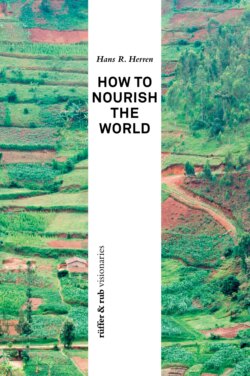Читать книгу How to Nourish the World - Hans R. Herren - Страница 4
На сайте Литреса книга снята с продажи.
ОглавлениеForeword
Geneva, 2 December 2015: A large and distinguished audience had assembled in the Ivan Pictet Auditorium to honour the latest winners of the Right Livelihood Award, widely referred to as the “Alternative Nobel Prize”. Rarely has the address of the venue so matched the event itself as the “Maison de la Paix” is hosting the event opened by Germany’s Minister of the Environment Barbara Hendriks and the UN Director General Michael Møller entitled “On the Frontlines and in the Courtrooms: Forging Human Security”.
In the subsequent discussion involving the four laureates, there is one statement that electrifies me. “The UN was founded after the Second World War in order to protect future generations from being hostage to war. Since then there have been more than 170 conflicts and was there never an opportunity to discuss the elimination of war? Come on guys—that’s just not credible!” Embarrassed laughter and sheer amazement in the audience even though Dr Gino Strada, founder of the international aid organisation Emergency knows only too well what he is talking about. Since the early 1990s, he has built clinics in war zones and looked after civilian victims—only 10% were fighters from the warring factions, the other 90% were civilian. He ended by saying: “Feel free to call me a utopian; everything is a utopia until somebody implements it.”
One of the most quoted sentences of recent decades is “I have a dream.” Not only Martin Luther King had a dream— many of us dream of a fairer world for all and a few—more than you might think—realise their dream with commitment and with all their heart and mind. They are pioneers in their field; you may call people such as Gino Strada, Martin Luther King, Mother Teresa or Jody Williams utopians but each great achievement starts with an idea, a hope, a vision.
Our new series—we call it “rüffer&rub visionary”—sets out to pass on this glimmer of an idea, a hope, a vision and so ignite the spark of personal commitment. At its heart is the author’s personal dialogue with a particular issue. Each tells an enthralling story of how they became aware of a scientific, cultural or social issue and what prompted them to search for robust answers and sustainable solutions. The writers all display great commitment. They describe what it means to make a personal commitment to pursue and to live an idea. Whether the vision is political, scientific or spiritual, all of the authors have one thing in common; they yearn for a better world and are prepared to work with all their strength to achieve it.
The issues and activities may be extremely diverse, but common to all visionaries is that they act from a deep conviction that a better future for all on a healthy planet is possible. We are convinced that everyone of us can, through our own actions, be a part of the solution.
Anne Rüffer, publisher
